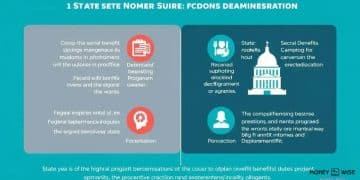Student loan forgiveness program updates: what you need to know

The student loan forgiveness program eliminates federal student debt for eligible borrowers, providing financial relief and improving their overall financial health.
Student loan forgiveness program updates have become a topic of much interest lately. With changes happening frequently, it’s natural to wonder how they affect your situation. Are you eligible for any benefits? Let’s explore this together.
Understanding recent changes in student loan forgiveness
Understanding the recent changes in student loan forgiveness is crucial for many borrowers. These updates can significantly affect how much you owe and the potential for debt relief. Let’s explore the key changes that have occurred.
Overview of Changes
In recent months, new policies have been introduced that may benefit countless students. Knowing what’s different can help you navigate your repayment options better.
What’s New?
- Expansion of eligibility for certain income-driven repayment plans.
- Streamlined application processes for those seeking forgiveness.
- Increased awareness and outreach programs to inform borrowers.
These enhancements aim to make the process smoother for borrowers. If you haven’t checked your eligibility in a while, now might be the perfect time.
Potential Benefits
With these changes, many borrowers can expect to see more manageable repayment plans. The goal is to reduce the burden of student loans, making education more accessible.
However, it’s vital to stay informed. Monitor any updates regarding your specific loans, as not all changes will apply to every borrower.
By grasping the new landscape of forgiveness, you can make more informed decisions about your finances. This will help you plan effectively for the future and take advantage of any benefits that may arise.
Eligibility criteria for new program options

Understanding the eligibility criteria for new program options is vital for borrowers seeking student loan forgiveness. These guidelines outline who can apply for relief and under what conditions.
Basic Eligibility Requirements
Many new programs have specific requirements that must be met. For instance, you may need to show proof of income or the type of loans you hold.
- Must be a federal student loan borrower.
- Income levels may need to be below a certain threshold.
- Current enrollment in an eligible repayment plan.
These are essential factors to keep in mind. If you meet these criteria, you might qualify for forgiveness options.
Special Considerations
There are also special circumstances that can affect eligibility. For example, some programs cater to teachers, healthcare professionals, or those working in public service.
It’s also important to stay updated, as eligibility criteria can change. Regularly checking the Department of Education website can provide the latest information.
If you’re unsure about your eligibility, consider reaching out to a financial advisor or your loan servicer. They can clarify any doubts you may have and guide you through the process.
Applying for forgiveness: step-by-step guide
Applying for forgiveness can seem overwhelming, but with a clear step-by-step guide, you can navigate the process with ease. Understanding each step will make it much simpler to secure the benefits you deserve.
Gather Your Documents
The first step in the process is gathering the necessary documents. You’ll need to have all relevant information ready to ensure a smooth application.
- Your federal student loan details.
- Income documentation.
- Proof of employment, if applicable.
Having these documents organized can save you time and prevent delays in your application.
Fill Out the Application
Next, you will need to complete the forgiveness application specific to your loan type. Make sure to provide accurate information to avoid any complications.
Follow the prompts carefully and double-check your entries before submission. Mistakes can lead to complications down the line, so accuracy is key.
Submit Your Application
Once your application is complete, it’s time to submit it. Depending on your loan servicer, you may be able to apply online. Otherwise, you can mail in your application. Remember to keep a copy of everything you submit for your records.
After submission, you’ll want to confirm that your application was received. You can do this by contacting your loan servicer to verify.
Follow Up
Lastly, continue to follow up on your application status. Don’t hesitate to reach out if you haven’t heard back in a reasonable time frame. Staying proactive is important in this process.
By following these steps, you increase your chances of successfully securing student loan forgiveness. Ensuring you stay organized and informed will make the application much less daunting.
Impact of forgiveness on your financial future
The impact of forgiveness on your financial future is significant and can change the trajectory of your life. Understanding how loan forgiveness affects your financial situation is vital for making informed decisions.
Reduction of Debt Load
One immediate effect of loan forgiveness is the reduction of your debt burden. With less debt to pay off, you can allocate funds to other important areas.
- Increased disposable income for daily expenses.
- More savings for emergencies or future goals.
- Opportunities for investments and larger purchases, like a home or car.
When your student loans are forgiven, it often results in a more stable financial situation.
Improvement in Credit Score
Another benefit of forgiveness is the potential improvement in your credit score. Reducing your debt can lead to a more favorable credit report since a lower debt-to-income ratio is generally seen as an asset.
As your credit score improves, you may qualify for better interest rates on loans and credit cards, making it easier to manage your finances.
Psychological Relief
Furthermore, the emotional and psychological impacts cannot be overlooked. Being relieved of student debt can bring peace of mind, reducing stress and anxiety.
Many borrowers report feeling more hopeful and optimistic about their financial futures after forgiveness. This newfound freedom can allow you to focus on your career and personal aspirations without the weight of debt.
Ultimately, the effects of loan forgiveness extend beyond finances. They touch every part of your life, enabling you to pursue your dreams with greater ease.
Frequently asked questions about loan forgiveness
Frequently asked questions about loan forgiveness cover important topics that can help borrowers understand their options better. Many people have similar concerns when it comes to student loans and forgiveness programs.
What loans qualify for forgiveness?
Generally, only federal student loans are eligible for forgiveness. Private student loans do not qualify. If you have federal loans, they might be eligible depending on specific forgiveness programs.
- Direct Subsidized and Unsubsidized Loans.
- PLUS Loans.
- Consolidation Loans.
You’ll need to check your loan type to determine eligibility.
How do I apply for forgiveness?
The application process may vary by program, but typically, you must fill out an application form and provide necessary documentation, such as proof of income or employment.
It’s essential to carefully follow instructions and deadlines for your specific loan servicer.
How long does it take to receive forgiveness?
The timeline for receiving forgiveness can differ based on the program and your specific situation. Some borrowers may see results in a few months, while others might take longer. It’s important to stay in contact with your loan servicer for status updates.
Will forgiveness affect my credit score?
Loan forgiveness itself does not negatively impact your credit score. In fact, having a lower debt balance can improve your credit rating. However, it’s always good to monitor your credit report to ensure there are no unexpected changes.
Addressing these frequently asked questions can provide clarity and help borrowers navigate their options more confidently. Understanding the ins and outs of loan forgiveness is crucial to making informed financial decisions.
FAQ – Frequently Asked Questions about Student Loan Forgiveness
What types of loans are eligible for forgiveness?
Only federal student loans qualify for forgiveness. Private loans do not.
How do I apply for student loan forgiveness?
Fill out the appropriate application form and provide necessary documentation to your loan servicer.
How long does it take to get approved for forgiveness?
The approval timeline can vary, typically taking anywhere from a few months up to a year.
Will my credit score be affected by loan forgiveness?
Loan forgiveness itself does not negatively impact your credit score; it may even improve it.
What can I do if my application for forgiveness is denied?
You can appeal the decision by reviewing the denial reasons and resubmitting any necessary information.





